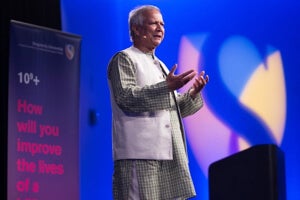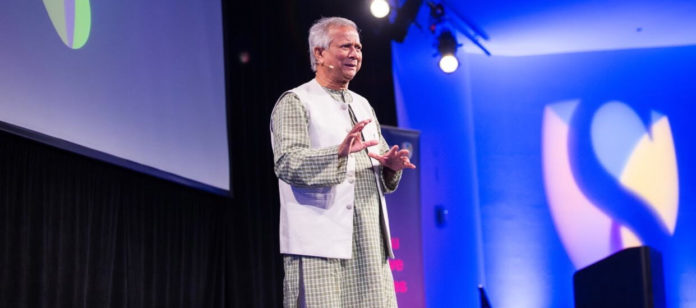Visiting Singularity University (SU) for the first time, social entrepreneur and Nobel laureate Muhammad Yunus said he wasn’t sure what to expect. But on meeting this year’s Graduate Studies Program (GSP) participants at the opening ceremony this week, he felt like a kid in a candy store.
“I felt like I should have been one of them,” he said.
The 10-week GSP brings together 80 participants from all over the world. Thanks to supporters of SU’s Global Impact Challenges and a generous contribution from Google, 2015 marks the first year GSP is a “means independent” program—that is, anyone who qualifies can attend, regardless of financial status.

Peter Diamandis, SU cofounder and executive chairman, said GSP participants are bright entrepreneurs interested in solving the world’s biggest problems. Exponential technologies are their paintbrush, the grand challenges their canvas. But to have the biggest impact, he said, you need something else too.
“It’s this absolute refusal to accept the status quo.”
Yunus, the night’s keynote speaker, focused on this theme. Over the last few decades, he has confronted the cycles and symptoms of endemic poverty with a series of social businesses, the first of which was the famous Grameen Bank.
He founded the bank as a response to loan sharking in local villages. At first, he loaned small sums of his own money to poor villagers. It fast became popular—so popular he was running out of money. He went to a bank to scale his project and was greeted with a great deal of skepticism his loans were wise.
“The more they said it cannot work,” he said, “the more stubborn I got…Unless you have done it you will never find out.” So, he started his own bank. Grameen and its microcredit philosophy grew fast. Today, the bank has loaned more than $12.5 billion to the poor. But it didn’t end there.
“Every time I see a problem,” Yunus said, “I create a business to solve it.”

To tackle night blindness, he started a seed business motivating people to plant vegetables to make up for vitamin deficiency. Now, he said, there is no more night blindness in Bangladesh. Other examples include yogurt to battle malnutrition and producing electricity in rural villages by distributing solar panels.
Sometimes the solution to a problem is just a clever recombination of older technologies or looking at them from a new angle. Sometimes it’s embracing newer technologies and showing how they can empower people around the globe.
Yunus isn’t interested in tech for its “charm” but in its power to solve problems. And that power has never been greater. With mobile phones and smartphones, he said, we are giving the voiceless a voice. And when we touch our phone and the “digital genie” materializes, increasingly it is able to fulfill our wishes.
“Now, I say, that Aladdin’s lamp is in our hand.”
Combining the latest technology with a social business can bring about even greater and longer lasting change. Philanthropy, Yunus said, is good, but it isn’t sustainable. Funds come in and go out, but they don’t come back. Organizations spend an inordinate amount of time and creativity raising money.
A social business, according to Yunus, is self-sustaining. The money goes out, gets to work on a problem, and then it comes back. You can use it repeatedly, multiplying its impact.
Further, philanthropy alone cannot push technology to new frontiers.
“Technology is like a car,” Yunus said. “It’s the driver who decides where to go.” Today, the profit motive is driving technology. And while that won’t go away (nor should it) Yunus increasingly sees another motivating factor, solving big problems, in the driver’s seat.
“This is the transition point,” he said. “Singularity University is sitting right in the middle of it, helping to make that transition possible.”
Image Credit: Nick Otto/Singularity University



